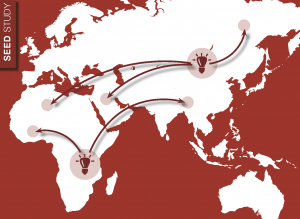Replicating successful business models - Moving from lighthouses to a network of street lamps

Imagine. There are a few big lighthouses scattered over a vast piece of land. Light from the lighthouse circles around, shining brightly, but only upon selected sections of the land; thus, light is only available to a selected number of people.
Now, picture the same vast piece of land but with many street lamps scattered around. Instead of light reaching only a few selected spots, much of the land is illuminated by the numerous street lamps. Though each individual street lamp is smaller in size, they are numerous and thus light reaches more people and areas than light from the few, though bigger, lighthouses.
Numerous small and growing enterprises can form a network of bright street lamps
It is a challenge to transition to a low carbon economy while improving the well-being of the world’s nine billion people. By replicating proven solutions, positive impact from eco-inclusive enterprises can spread, and facilitate the transition to a low carbon economy while also improving social conditions as set in the SDGs. These reproduced proven solutions at the local level represent street lamps in the above analogy. Numerous street lamps scattered around a land result in much of the land being illuminated and a greater number of people having access to light, just as numerous, successful small and growing eco-inclusive enterprises can altogether create huge impact.
Over the last ten years, SEED has awarded more than 200 enterprises in over 40 countries for developing business models which contribute to sustainable development by solving social and environmental problems on a local level. Each of the 222 SEED Award Winners has provided real-life, inspiring examples that change is possible. Moreover, SEED Winners include low-income people in their businesses, thus helping to improve the well-being of the poor. 88% of SEED Winners continue in business, with 70% meeting or exceeding expectations. There are many successful business models to replicate, and great potential impact to be made.
The newly published SEED Replication Study that SEED has compiled together with endeva describes the multiple pathways to replication. Some SEED Winners have already started to venture onto the various pathways towards replication, such as through establishing branches, franchises, partnerships, joint ventures and opening up the model.
The Multiple Pathways towards Replication
-
Wholly owned branches – Waste Enterprisers recycles human waste into renewable fuel for industrial kilns and boilers in Kigali, Rwanda. It has plans to establish branches in other African cities.
-
Franchising – Tambul Leaf Plates, an enterprise which produces and markets disposable tableware through community-owned microenterprises has created a network of village level micro-entrepreneurs who collect the fallen sheath of areca nut palms, the basis of the disposable tableware.
-
Partnerships – Almodo offers training and waste management services to municip
ialities and civil society organisations, establishing partnerships with local city councils in various countries. It has also trained other entities to set up similar models. -
Joint ventures – Diseclar, an enterprise which processes collected plastic with agro-industrial waste to produce ecological furniture and desks, plans to form a joint venture in Mexico to replicate the model and establish a new manufacturing unit which will use local agricultural residues and plastic waste to make furniture products there.
-
Opening the model – A Global Marketing Partnership for SRI Indigenous Rice has spread rice cultivation methodology to farmer organisations around the world with the help of Cornell University. It also has a partnership with US-based Lotus Foods, a rice company which markets traditional rice varieties using the enterprise’s System of Rice Intensification (SRI) methodology.
Each replication strategy benefits people at the base of the pyramid and offers an effective approach to multiply impacts and thus contribute to low-carbon economies without having to “reinvent the wheel”. This raises the question of why structured and extensive replication is still in its infancy. What barriers do entrepreneurs currently face when seeking to replicate low-carbon green and inclusive business models and what can different actors do to support successful replication? You can find out more on the answers SEED gives in the replication study, and we invite you to discuss the topic with us at the SEED Africa Symposium in Nairobi from 28-29 September (this month!).
Recommendations to support successful replication for a low carbon economy
Let’s start the discussion with the four recommendations outlined in the replication study for governments, research, financing institutions and incubators to support successful replication of climate-smart business models:
-
Incorporating small-scale solutions into programmes and policies for low carbon development. Countries can include small-scale solutions in their Nationally Determined Contributions (NDCs) to provide more comprehensive and effective policies, while at the same time supporting SMME growth and job creation.
-
Identifying the most impactful solutions and showcasing them. Green and inclusive businesses have already developed low carbon products and services that improve the lives of the poor. Vetting and closely documenting these solutions can inspire action from various stakeholders.
-
Actively supporting dissemination through dedicated funding, information and capacity building. Various actors are needed to support businesses through replication.
Join us for the conversation at the #SEEDAS16 and read the complete study here.
This blog is part of the October 2016 series on Exploring the social enterprise landscape, in partnership with the World Bank Group and endeva. Read the whole series for insight and opinion on policy, business models and definitions from social entrepreneurs, policy makers and facilitators around the world.